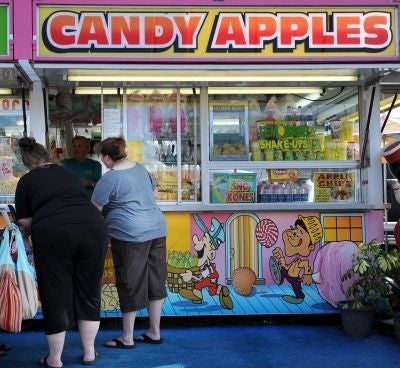Junk food tax could help fight obesity: US study

Your support helps us to tell the story
From reproductive rights to climate change to Big Tech, The Independent is on the ground when the story is developing. Whether it's investigating the financials of Elon Musk's pro-Trump PAC or producing our latest documentary, 'The A Word', which shines a light on the American women fighting for reproductive rights, we know how important it is to parse out the facts from the messaging.
At such a critical moment in US history, we need reporters on the ground. Your donation allows us to keep sending journalists to speak to both sides of the story.
The Independent is trusted by Americans across the entire political spectrum. And unlike many other quality news outlets, we choose not to lock Americans out of our reporting and analysis with paywalls. We believe quality journalism should be available to everyone, paid for by those who can afford it.
Your support makes all the difference.Taxing high-fat and sugary junk food is a more effective way to fight obesity than making healthy foods like fruit and vegetables more affordable, a study published Wednesday shows.
Researchers at the University of Buffalo in New York, led by psychologist Leonard Epstein, gave 42 mothers just over 22 dollars to spend at a "supermarket" set up in a room at the university and stocked with images of everything from bananas to whole wheat bread to cola drinks and cookies.
The women were told to imagine that they had no food in the house and that they were going to the supermarket to get the week's shopping for their family.
In the simulated supermarket, the women had the choice of 30 healthy and 30 junk food items, four healthy beverages - two types of juice, skim milk and water - and four sugary drinks, all represented in images.
The women went shopping five times. The first time, the prices of all the food and drink items were on par with those in a local supermarket.
Twice, the prices of healthier foods - those that deliver more nutrients for fewer calories - were lowered, and on the remaining two shopping trips, the prices of the unhealthy food and drink items were raised.
The researchers found that hiking the price of junk food, as would happen with a so-called "sin tax," was more effective at getting the women to buy a week's shopping that was lower in overall calories than was cutting the price of the healthy food items.
In fact, cutting the prices of healthy foods like broccoli, yoghurt, grapes, eggs and fish actually increased the overall calorie value of the foods and drinks the women put in their shopping carts.
"It appears that mothers took the money they saved on subsidized fruits and vegetables and treated the family to less healthy alternatives, such as chips and soda pop," said the authors of the study, published this week in Psychological Science.
"Subsidizing broccoli and yoghurt... may be unlikely to bring about the massive weight loss the nation now requires," they said.
Around a third of US adults older than 20 and nearly one in five US kids aged six to 19 are obese, according to the Centers for Disease Control and Prevention.
Taxing junk food, on the other hand, seemed to do the trick. The mothers cut back on high-calorie, low-nutrient foods and bought more healthy foods that were lower in calories.
In the experiment, taxing junk foods by 10 percent resulted in the shoppers buying 14.4 percent less high-fat and sugary foods and drinks. That meant their week's shopping contained 6.5 percent fewer calories, the study said.
kdz/fgf
Join our commenting forum
Join thought-provoking conversations, follow other Independent readers and see their replies
Comments